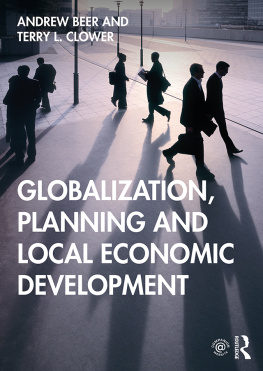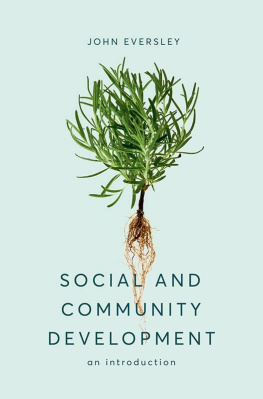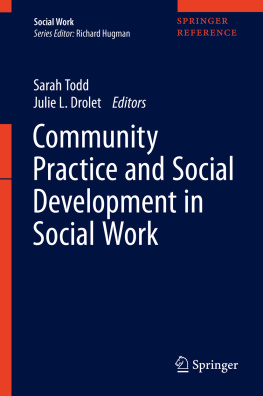COMMUNITY ECONOMIC
DEVELOPMENT IN SOCIAL WORK
FOUNDATIONS OF SOCIAL WORK KNOWLEDGE
Frederic G. Reamer, Series Editor
FOUNDATIONS OF SOCIAL WORK KNOWLEDGE
FREDERIC G. REAMER, SERIES EDITOR
Social work has a unique history, purpose, perspective, and method. The primary purpose of this series is to articulate these distinct qualities and to define and explore the ideas, concepts, and skills that together constitute social works intellectual foundations and boundaries and its emerging issues and concerns.
To accomplish this goal, the series will publish a cohesive collection of books that address both the core knowledge of the profession and its newly emerging topics. The core is defined by the evolving consensus, as primarily reflected in the Council of Social Work Educations Curriculum Policy Statement, concerning what courses accredited social work education programs must include in their curricula. The series will be characterized by an emphasis on the widely embraced ecological perspective; attention to issues concerning direct and indirect practice; and emphasis on cultural diversity and multiculturalism, social justice, oppression, populations at risk, and social work values and ethics. The series will have a dual focus on practice traditions and emerging issues and concepts.
The complete series list follows the index.
Community Economic Development in Social Work
Steven D. Soifer,
Joseph B. McNeely,
Cathy Costa, and
Nancy Pickering-Bernheim

COLUMBIA UNIVERSITY PRESS NEW YORK
COLUMBIA UNIVERSITY PRESS
Publishers Since 1893
New York Chichester, West Sussex
cup.columbia.edu
Copyright 2014 Columbia University Press
All rights reserved
E-ISBN 978-0-231-50857-5
Library of Congress Cataloging-in-Publication Data
Soifer, Steven.
Community economic development in social work / Steven D. Soifer,
Joseph B. McNeely, Cathy Costa, and Nancy Pickering-Bernheim.
pages cm. (Foundations of social work knowledge)
Includes bibliographical references and index.
ISBN 978-0-231-13394-4 (cloth : alk. paper) ISBN 978-0-231-13395-1 (pbk. : alk. paper)
ISBN 978-0-231-50857-5 (e-book)
1. Social work administration. 2. Community development. I. Title.
HV41.S674 2014
307.1'4dc23
2014014344
A Columbia University Press E-book.
CUP would be pleased to hear about your reading experience with this e-book at .
Cover design: Lisa Hamm
Cover image: plainpicture/Christof Mattes
References to websites (URLs) were accurate at the time of writing. Neither the author nor Columbia University Press is responsible for URLs that may have expired or changed since the manuscript was prepared.
COMMUNITIES ACROSS THE UNITED STATES and around the world have been devastated by the ups and downs of the global economy for over a generation. Economic factors in combination with scourges such as racism, classism, and sexism have created conditions such that countless inner-city neighborhoods could aptly be described as war zones. Burned-out and abandoned buildings, vacant and overgrown lots, drug dealing, murder, homelessness and hopelessness, adults and kids hanging on the streets for lack of jobs and boredom at school, failing public schools, general neighborhood blight, and myriad other problems persistently plague these areas.
In some cities, civic leaders see the salvation of these areas in a kind of gentrification. A new baseball stadium is built. A waterfront is redeveloped. Houses are rehabbed. People with higher incomes start moving in. Police begin to patrol regularly, crime goes down, property values increase, businesses open up, and voil, a hot new neighborhood is born. But the former population is gone. This kind of neighborhood change is not community economic development. It is development, even economic development, but it occurs because of unbridled market forces. In a very real sense, the community is left out of the development process. And in actuality, most of the residents who lived in these neighborhoods for years or even generations are forced out only to relocate to another devastated part of town. The existing residents do not profit from the redevelopment and gentrification of these neighborhoods; the speculators and middle- to upper-middle-class people who move there do. Community economic development is an alternative method of economic development: it is an antidote to development based on unbridled market forces, and it has demonstrated success in cities across the country in a wide variety of neighborhoods.
This book presents to social workers the field of community economic development (CED), or, as some have begun to refer to it, community building. There is a rich history behind this practice, much of which has not been part of todays social workers education and training. This is ironic because, in many ways, the story of this field of practice is the story of social work. The origins of the CED field owe much to social workers, especially community organizers, and CED methods are right in line with the mission and values of social work and the existing skill set of social work practitioners. Yet, with few exceptions, social workers infrequently take employment today in the CED field.
Reversing this trend could bring the gifts of social work to one of the most important challenges to the continued success of CED in low-income, culturally diverse communities. We believe that CED has entered a new stage of practice, a more comprehensive community-development approach to economic development that calls for a closer relationship between business and real estate development and family self-reliance and community empowermentareas long the strength of social workers. Revealing the relevance of CED to effective social work practice is the primary motive for writing this book.
In this book, we provide a framework of CED that social workers can use as a baseline for practice as well as innovative methods for incorporating social work practices and skills into the CED field. We explore how social workers core values for working with individuals, families, groups, organizations, and communities align with CED practice. And we demonstrate why coursework in CED practice should be fully incorporated into social work curricula across the country.









 COLUMBIA UNIVERSITY PRESS NEW YORK
COLUMBIA UNIVERSITY PRESS NEW YORK
